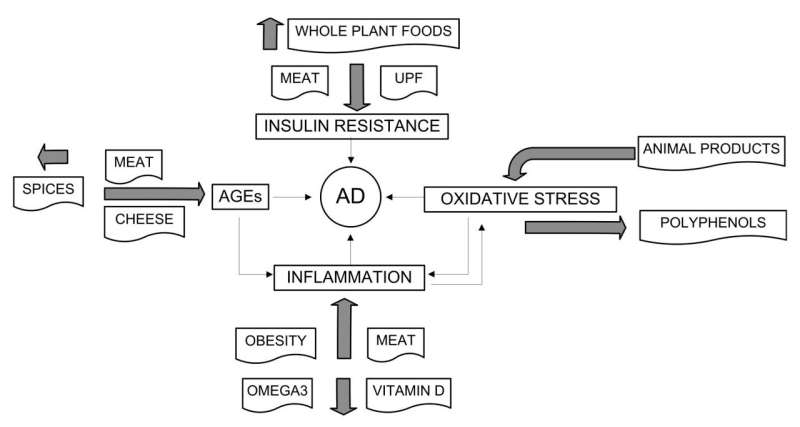This article has been reviewed according to Science X's editorial process and policies. Editors have highlighted the following attributes while ensuring the content's credibility:
fact-checked
peer-reviewed publication
trusted source
proofread
Understanding diet's role in modifying risk of Alzheimer's disease

In a detailed study, "Diet's Role in Modifying Risk of Alzheimers Disease: History and Present Understanding" published in the Journal of Alzheimer's Disease, we can finally see which diets are helpful in reducing the risk of developing Alzheimer's disease. The role of diet in modifying the risk of Alzheimer's disease is discussed in detail.
Diets that are more plant-based, like the Mediterranean diet and traditional diets in China, Japan, and India, are shown to reduce risk, especially when compared to the Western diet.
Alzheimer's disease rates rise in these countries as they make the nutrition transition to the Western diet. This study identifies dementia risk factors, including higher consumption of saturated fats, meat, especially red meat such as hamburgers and barbeque, as well as processed meats such as hot dogs, and ultra-processed foods high in sugar and refined grains.
This review also lets us know why certain foods increase or reduce the risk of Alzheimer's disease. For example, meat raises the risk of dementia the most by increasing risk factors such as inflammation, insulin resistance, oxidative stress, saturated fat, advanced glycation end products, and trimethylamine N-oxide. This study also outlines several foods that are protective against Alzheimer's disease, such as green leafy vegetables, colorful fruits and vegetables, legumes (like beans), nuts, omega-3 fatty acids, and whole grains.
Ultra-processed foods can increase the risk of obesity and diabetes, themselves risk factors for Alzheimer's disease. Ultra-processed foods often lack the very ingredients found in whole plant foods that keep dementia away, such as anti-inflammatory components and antioxidants.
Poverty is an important driver of Alzheimer's disease in the US since ultra-processed foods and meat are cheaper sources of energy than fruits, vegetables, whole grains, and other more nutritious foods, thus promoting obesity.
The paper also suggests that Alzheimer's disease rates in the US are projected to increase by 50% from 2018 levels by 2038. This calculation is based on comparing trends of obesity in the US with Alzheimer's disease trends. This comparison shows a 20-year lag between obesity rates and Alzheimer's disease rates. This estimate is very close to the estimate published by the Alzheimer's Association in 2018, an estimate of a 56% increase.
Our estimate suggests that the rising trend of obesity, due to the consumption of meat and ultra-processed foods is the force driving dementia. Although our personal risk of Alzheimer's disease can be reduced with diet, it is expected that those who continue to eat the Western diet will continue to have a higher risk.
"Grant and Blake comprehensively review and synthesize the role of dietary factors in Alzheimer's disease. Evidence from diverse perspectives support that a diet that emphasizes fruits, vegetables, legumes, nuts, whole grains, and…de-emphasizes meat, especially red meat, saturated fats, and ultra-processed foods is associated with lower risk of Alzheimer's disease," says Edward Giovannucci, MD, ScD, Professor of Nutrition and Epidemiology, Harvard University.
"Physical inactivity and obesity also contribute to higher risk. In addition, the dietary and lifestyle patterns associated with a higher risk of Alzheimer's disease are known to affect the constellation of mechanisms believed to increase risk, including inflammation, insulin resistance, and oxidative stress, among others. Grant and Blake make a strong case that, while further research is needed to better understand the mechanisms, diet and lifestyle factors linked to diabetes, cardiovascular disease, and some cancers are likely to influence the risk of Alzheimer's disease."
"Grant and Blake provide a comprehensive review on the dietary and other factors that affect the risk of Alzheimer's disease (AD). Apart from the particular type of diet, they demonstrate that the consumption of red meat, insulin resistance, obesity, reactive oxygen species, oxidative stress, phytochemicals, and homocysteine, among other factors, interact with neuroinflammation and play a major role in the etiology of AD. This treatise provides an excellent overview of modifiable risk factors for AD," says Paul Marik, MD, Chairman and Co-Founder, Front Line COVID-19 Critical Care Alliance.
More information: William B. Grant et al, Diet's Role in Modifying Risk of Alzheimer's Disease: History and Present Understanding, Journal of Alzheimer's Disease (2023). DOI: 10.3233/JAD-230418


















